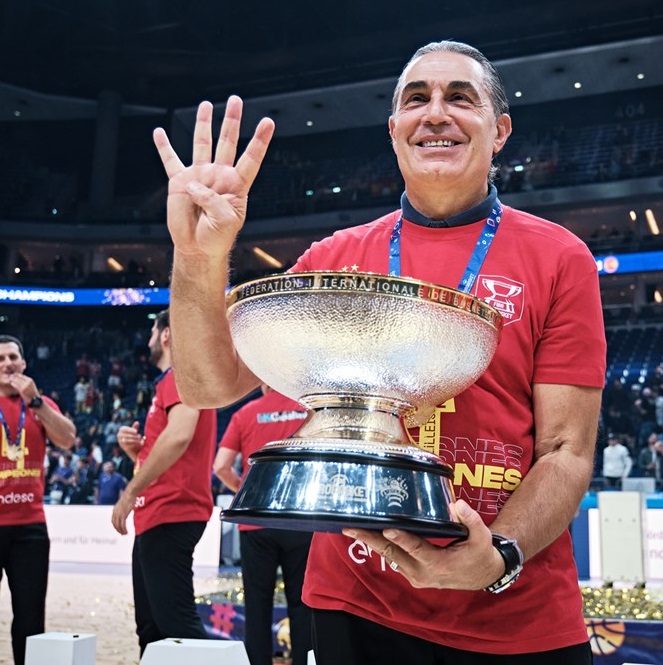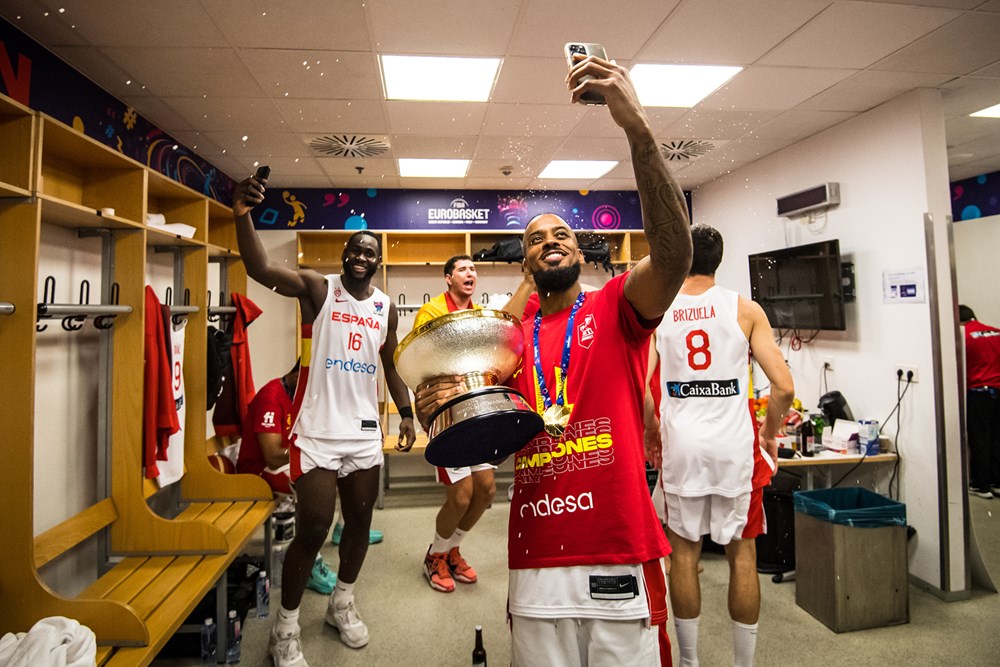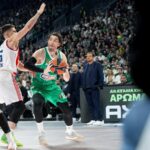
With his fourth EuroBasket title being won two Sundays ago, making it his fifth major international trophy as a head coach to go along with a NBA championship as an assistant with the Toronto Raptors, Sergio Scariolo has had quite a career and he’s managed to stay relevant by refusing to stop learning. Emmet Ryan explains.
I never gave Spain a chance in this tournament. It was easily the weakest roster brought by the perennial EuroBasket kings in two decades and the decision to naturalise Lorenzo Brown felt like a desperation move. Spain would, of course, not only win the whole tournament but do so while innovating repeatedly.
In the group phase they looked ropey yet still came out with the top seed. Against Lithuania they looked fragile yet moves were made and the game was won. Finland went on a record setting run in the first half against them in the quarter finals yet Spain roared back. The route to victory over Germany in the semi-finals came from a player who’d only been averaging 16 minutes a game. And the final? With 90 seconds remaining in the first half it felt like Spain had already won. There’d be a French comeback but that would get checked too.
A resistance to ignorance
Scariolo succeeded despite veteran coaches of the European game often floundering in this tournament. Serbia’s Svetislav Pesic has been coaching long enough that nobody’s going to tell him how to coach and that’s kind of the problem. After his side exited at the last 16 stage, with a dire performance against Italy that was defined by Serbia having no plan besides giving the ball to Nikola Jokic, Pesic said he wasn’t going to change his ways.
Scariolo, 61, is a decade younger than Pesic but has developed the same respect that people tell him what to do but he is more than willing to ask. When Scariolo went to Toronto to work as an assistant with the Raptors, it could have easily been seen as a step down albeit to a NBA side.
He, of course, won a ring and set in motion a curiously complicated and often coincidental heavy Raptors influence on this Spanish side. Brown came on Scariolo’s radar all the way back then in 2019, long before he knew Ricky Rubio would be too injured to play in a 2022 tournament. That the federation president of Spain happens to be a former Raptor, Jorge Garbajosa, is incidental but amusing and, of course, the man who came good in the final for Spain is a newly minted member of that Toronto team in Juancho Hernangomez.
More importantly, that sojourn was a chance for Scariolo to be a pure sponge in absorbing every new coaching idea he could from across the Atlantic to blend it with his own philosophies and evolve the way his teams play. It would have been easy to assume that given the way he coached teams had led to great successes in years past, 3 EuroBasket titles and the 2019 World Cup crown, that he knew enough about basketball. Scariolo however simply refuses to allow his ego get in the way of his development.
Urgency not panic
Spain had some moments where it would have been easy to simply press the big red button in this tournament or even accept the basketball gods had failed them. There was the moment where everyone’s doubts about Spain seemed to be confirmed, with a first loss in 51 years to Belgium. That could have made Scariolo throw his hands up and make sweeping changes but the adjustments remained gradual.
BallinEurope is ramping up its YouTube game this season. Subscribe to our channel now for player exclusives, analysis videos, and much more.
Against Lithuania, his side looked to have closed everything out when a sudden surge saw LTU force overtime. The momentum appeared to be with the team that had made the comeback but Scariolo settled things down, turned to Brown as the best option to kill off the confidence surge Lithuania was feeling, and the matter was dealt with relatively easily.
Finland had all the energy in the world in the first half of their quarter final. Scariolo trusted that his side wouldn’t let it get to them, despite falling into a 15 point hole at half time. He took a more aggressive approach defensively, figuring rightly that it wasn’t going to harm his side’s offence more than trying to run directly with an opponent that liked speed.
Then came the most extraordinary move of the lot, even bigger than the “Bo Cruz”* display in the final. This time it was home court energy going against Scariolo’s side as Germany had an energetic crowd willing them on and, for the third straight elimination game, Scariolo’s side went 10 points behind. For the third straight game, he saw what he needed to do and went to Alberto Diaz to be the defensive menace. In a game that Spain ended up winning by just a handful of points, the team outscored Germany by 25 points whenever Diaz was on the floor.
*On the off-chance you were unaware, Juancho Hernangomez played the fictional Bo Cruz in the movie Hustle and the character’s name was trending worldwide on Twitter after the game.
Four challenging moments, four different answers, but always the same process of not letting the moment overwhelm him while being cognisant of the need to make the right decision.

Scariolo’s decision to brng in Lorenzo Brown was not without controversy but proved crucial to securing Spain’s victory.
Learning while winning
How Scariolo responded to moments of high stress and the importance of these decisions is easy to explain. That he also showed he didn’t need to face calamity in order to prove his approach is beneficial was an illustrative bonus.
In the final his side turned to Juancho from the outside and how. France had clearly prepped itself for an inside out battle, where it expected Spain to try and use Willy Hernangomez, Juancho’s brother and the tournament MVP, to battle its trio of Rudy Gobert, Vincent Poirier, and Moustapha Fall and create room on the outside as they looked to close him down. Instead Spain opted to go outside-in, happily letting France try to take them on with one-on-one battles on the perimeter that eventually forced more room for Willy.
Then, with his side off to a fine start, Scariolo turned the screw in the second quarter by unleashing Juancho. Granted, he couldn’t have expected it to go quite so well as he hit 6 of 7 from deep in that first spell (and eventually made a 7th in the second half) but Scariolo did everything he could to capitalise on the run as France were perplexed by the younger Hernangomez hunting for far more outside opportunities than expected.
BallinEurope has a book, a real life actual book called I Like it Loud, and you can buy it on Amazon now. It’s here as a book and here in Kindle form.
France mounted a comeback through the end of the second half and into the third quarter, turning a 21 point deficit into 3 points at one stage, but again Scariolo made a smart adjustment. He realised he needed a more slashing form of defender to disrupt France’s game so Jaime Fernandez took that role and initiated a string of fast breaks as Spain ended up winning the points from turnovers battle by a huge margin.
The right communicator
I wrote last week about how coaches whose go-to option is to shout are struggling with the modern game not because younger players don’t like it but, far worse, because they’re apathetic to that form of motivation.
Scariolo needed to develop a team that could believe in itself despite its biggest stars of the past two decades, Pau and Marc Gasol (both retired from international play although Marc has returned to Spain’s top flight with Girona after 14 years), its current top star, Ricky Rubio (injured), and its top veteran, Sergio Llull (injured) all being unavailable. The natural leader on the floor, Rudy Fernandez, was only going to play so many minutes and it was a risk to ask him to carry the scoring load.
Shouting the kind of nuanced solutions required here really are only going to get you so far. Don’t get me wrong, there are moments where the raised voice of a coach is necessary but the best ones know two things. Firstly, to be selective in when they use it. Secondly, to be selective in how they use it. When a coach gets loud, it needs to be focused not mad because mad implies that the coach has lost control and a team like this Spain outfit was looking to the bench for control. Focused, it can show you’re not happy but the real goal is to show frustration and how the player can be the solution to that frustration.
After Spain’s title win, Jorge Garbajosa spoke about how he didn’t expect Spain to win the tournament and praised Scariolo
Knowing what’s within his control
After the semi-final win over Germany, Scariolo made a fine point that showed the respect he has for the entire Spanish development system. Spain reached European finals in U16, U18, and U20 for both men and women along with both the U17 World championship finals. This was Spain’s 9th final of the summer and Scariolo, who is Italian but married to a Spaniard, gets that the senior teams are part of a system designed to continuously find new talent.
That said, he lost Llull and knew ahead of time that he didn’t have Rubio. The decision to pursue Brown to play for Spain was controversial. FIBA allows nations to include one naturalised player, which is essentially any player who gets a passport via any means after their 16th birthday. It’s particularly popular with smaller nations although individual state passport laws makes its application variable even among those nations. There are countries where the idea of it is an absolute no, most notably Serbia.
Spain has used this rule before, quite a few times, most notably with Nikola Mirotic and Serge Ibaka. In both cases, they established themselves as residents of Spain and played with Spanish clubs so proved less controversial.
Brown’s inclusion was a much bigger deal as he had no nominal ties to the nation yet Scariolo insisted that Spain took that extra step to include him. It showed trust in his own abilities but also in his ability to reason with Garbajosa and the federation about the importance of the move for the continued development of the national programme. Including Brown proved a masterstroke in the end but Scariolo made the decision based on where he felt he couldn’t solve the matters through his normal means.
That required him trusting that the federation would trust in him to want to do what was best for Spain’s long-term plans, especially as it is probable that this was Scariolo’s last tournament as national team coach (as much his call as any) as less trusting employers would have been wary of backing a coach with nothing to lose.
Instead, they recognised that he cared for the overall health of Spanish basketball and not just because his wife used to play for Spain (including winning a women’s EuroBasket a full 16 years before Scariolo matched that achievement for the men).
Scariolo wants to keep learning because why go heavy to try and win one trophy when you can be calm and win a bunch, of in Scariolo’s case be calm and win the one that would have been a gamble while being set to keep on improving and keep on winning.
It’s going to be a necessity for European coaches going forward to follow the Scariolo example, at all levels, because the glorious recycling of the same names in the likes of Euroleague appears to be headed for its inevitable failure through sheer proof that it never works.
If you want to win, you don’t just need someone smart enough to do so. You need someone who knows they’re not yet smart enough to do so tomorrow but they can work on that.




Leave a Reply